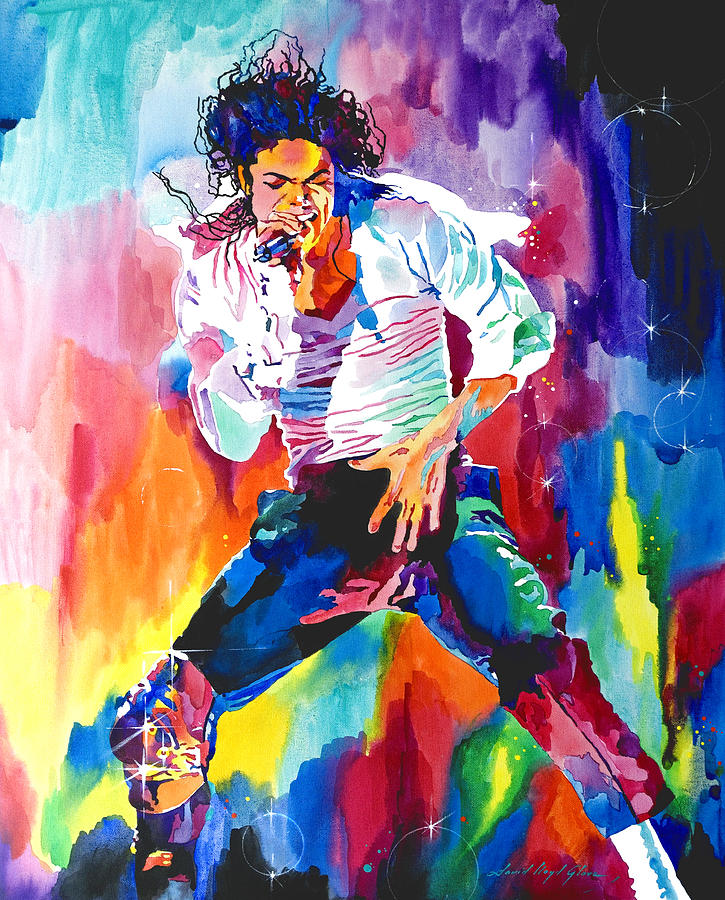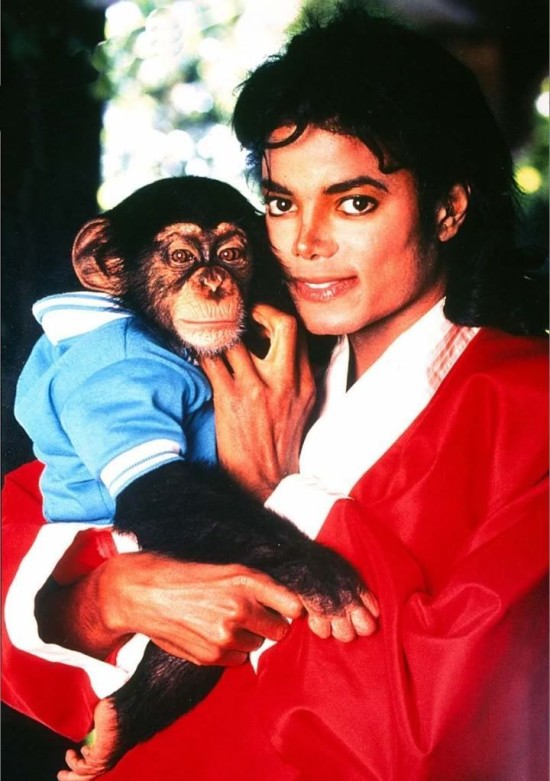Is today’s script a spiritual sequel to yesterday’s entry? They’re both about bubbles. As long as we’re on the topic, David Lynch should ditch Saliva Bubble and direct this. It would be EPIC!
It’s finally here! The culmination of Weird Scripts Week! On Monday you saw us deal with James Bond and robot sharks. On Tuesday, talking cows. On Wednesday we went into the mind of a man living his own musical. Yesterday’s script was about spit. But today is truly the pinnacle of weirdness. Get the drugs out and enjoy…
Genre: Biopic
Premise: I told you I was saving the craziest for last. How ‘bout a biopic of Michael Jackson told through the eyes of his chimpanzee, Bubbles!
About: This script went out earlier this year, and while it’s got about as much chance of getting made as Uwe Boll does helming a Star Wars movie, it wins the “Oh I’ve gotta read this” premise of the year award. While writer Isaac Adamson doesn’t have a legendary list of IMDB credits, he’s far from a stranger to Hollywood. His first novel, Tokyo Suckerpunch, has been in development for years at Sony. If Allan Loeb’s Collateral Beauty is ending up number 1 on this year’s Black List like everyone is telling me it will (I still haven’t read it – saving it for when I can relax and enjoy), my guess is that Bubbles ends up at number 2.
Writer: Isaac Adamson
Details: 122 pages
Isaac Adamson, I don’t know who you are. But you’re a genius, my friend.
This is one of those ideas you and your screenwriting friends come up with at 3 in the morning after a night of drinking, laugh uproariously about, then after the laughter’s died down, you proclaim, “No, but really, what if I ACTUALLY wrote it?” And then everyone laughs and says, “Yeah, you should TOTALLY write it.” “Oh my God. Yeah. That would be hilarious!”
And then the next morning through the foggy haze, before you’ve emptied your loose change on three Sausage McGriddles, you remember your crazy premise about telling Michael Jackson’s story through his chimpanzee’s point of view and you grimace and say, “Was I bananas??”
Isaac Adamson must have put down the McGriddles because he not only wrote it, he committed to it. And really, that’s the only way to do it. When you come up with a gimmick premise, you quickly find that there’s nothing to really say past page 15. You’ve introduced the gimmick. What’s left to do?
If you want to extend an idea like that into feature length, you have to embrace and treat the characters like real people, with real problems and real conflicts. And with the exception of Bubbles’ thoughtful meanderings, that’s exactly what Adamson does.
“Bubbles” opens up with a voice over from Bubbles himself. It’s present day and Bubbles lives in a cage along with a number of other animals. He’s not thrilled about it, but as he explains to us in the coming pages, he’s not sure he prefers his previous life either.
Flash back to 1985, the height of Michael Jackson’s fame. Michael has just come out with Thriller, the biggest album of all time! And he wants more. He wants his next album to do the impossible – to sell 100 million records.
He also doesn’t want to be alone during that journey. When you reach that kind of fame, it’s difficult to find friends. This is usually where your family comes in, but Michael’s family, particularly his evil father, Joe, is more interested in using Michael’s fame to jumpstart their own careers than support and love their son/brother.
So Michael buys a monkey! Whereas Michael is childlike and simplistic, Bubbles is a cross between an overly-educated Oxford graduate and a Roman philosopher. He ruminates about Michael’s life choices with such voice over lines as: “Should I have been alarmed that the notion of myself as sovereign provoked such laughter from The King? Or that seeing me festooned in the regal accouterments induced only befuddled discomfiture from these hirsute gentlemen of New Jersey?”
Michael and Bubbles become fast friends, and Bubbles takes pride in that a man who everyone refers to as “The King” has made him his prince. We follow the two through Michael’s struggles to make that impossible 100 million copy album, and during that time, Bubbles, too, becomes a celebrity (particularly in Japan).
But things start to change when Michael moves into Neverland Ranch, a place where he’s finally free of his blood-sucking family. Neverland brings with it many children, distracting Michael from Bubbles. And when one particular child, Jordan Chandler, becomes Michael’s best friend, Bubbles feels like he’s on the outs.
When Jordan’s father (who happens to be a screenwriter!) threatens to sue Michael for molesting his child, Michael’s kingdom, as well as his friendship with Bubbles, unwinds to a point where it can never be salvaged again.
We always talk about how once you find your idea, or your subject, you need to find your angle. Your angle can take what’s, at face value, a generic idea, and bring it to life. I mean, imagine if this was just another Michael Jackson biopic. Adamson would be lucky if Lifetime requested it. By exploring Michael through the angle of his pet chimpanzee, we get a completely unique perspective of the pop star. What was once dull is now fresh. This was the first great choice Adamson made.
The second was to treat everybody here like real people. Once you treat your characters like real people, your reader will actually invest in them. This doesn’t work if you play everyone as a farce. This was my problem with yesterday’s script. Nobody in One Saliva Bubble was real. They were all goofy gimmicks, and therefore we could never get inside of them. For a short movie, gimmicks are fine. For a feature, though? If you’re going to ask someone to sit still for two hours? You need to give them something to invest in.
With that said, I was surprised how far Adamson went down this path. I was curious how he would treat the child molestation charges on Michael but he faces them head on – to the point where they’re the climax of the story (okay, that was unintended, I swear). And because we’d invested so much in Michael by this point – seen how everyone around him existed only to take advantage of him – we really cared about what happened next.
Bubbles the character is a mixed bag. His high-brow observations do get a little tedious at times, but more often than not, they’re fun. For example, when Michael leaves the house only to come back with bandages on his face, Bubbles assumes that his “King” must have gone off to battle, defending his kingdom and defeating his many foes.
And it’s not like he’s unconnected to the plot. His jealousy of the people who hang around Michael are what drive his actions, and it’s why (spoiler), in the end, he’s forced to leave Neverland Ranch.
My issues with “Bubbles” are tempered by the commitment to the idea, but I did have a problem with the script length. This is the kind of premise you want to get in and out of faster than a Hollywood and Vine escort. There’s an entire “Michael in the UK” section that Bubbles doesn’t even participate in that easily could’ve been excised.
I also wished there was more Joe. When you have any script that doesn’t fit nicely into a movie-like structure (which is the case with most biopics), a great villain can be a huge help. You get the audience so wound up about the antagonist and so obsessed with seeing his demise, that they don’t even notice the movie’s flying by. From everything I’ve read, Joe Jackson is a terrible person, especially to Michael. So I would’ve loved to have seen that conflict explored more.
This script will probably never sell and most definitely will never be made. But it does so much more. It shows Hollywood that you’re not afraid to think outside of the box. And while Hollywood loves its formulas, the people who work within it secretly pain for these new voices, for new ideas, for new angles. Those angles may never make it to the big screen, but those writers are admired and called upon again and again for potential writing assignments because they showed that they could go where other writers were too afraid to. So while Bubbles isn’t a perfect story, it’s perfect in its uniqueness, which is why I’d be an idiot not to call it impressive.
[ ] what the hell did I just read?
[ ] wasn’t for me
[ ] worth the read
[x] impressive
[ ] genius
What I learned: As simplistic as this sounds, if there’s one thing I’ve learned from this week, it’s that if you want to write something weird, utilizing animals in some unique way is a good place to start. Especially if you want to make the Black List, which thrives on celebrating weird stories. High-ranking Black List scripts The Beaver, The Muppet Man, and The Voices all focused on animals in some weird way. Add Bubbles to that list.



